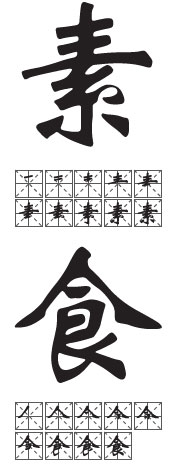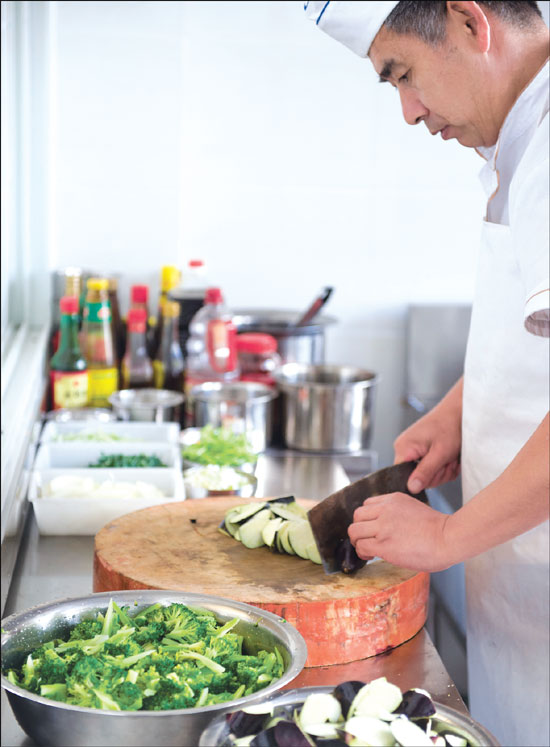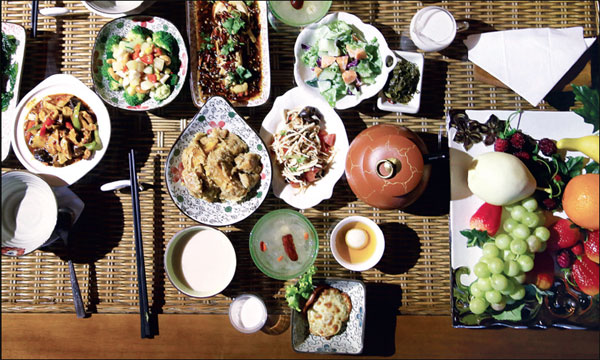Veggie values
Spurred by health concerns and Buddhist benefits, vegetarianism is taking root in China
Xing Lihong decided to go vegan (食素, shí sù) after spending a week at the Donglin Temple, Jiangxi province, in the summer of 2005 - but she'd been readying herself for the decision since 2002; after reading Buddhist and nutritional texts, she began abstaining from meat on the first and 15th of every lunar month.
"At first, I felt hungry and craved for meat," Xing confesses. "I often ate a lot after the two 'vegetarian days', as a form of compensation." But gradually she got used to the new regimen. "I'm convinced that 'everything has a spirit', and it's this belief that makes me stick to it."
|
A Shandong traditional cultural center offers a free vegetarian lunch of four dishes and a soup to locals; the center promotes the spirit of "great love" by opposing the killing of animals. Photos Provided to China Daily |
|
A table of vegetarian dishes, offered by a high-end restaurant in Kunming, Yunnan province, is priced at 160 yuan. |
Xing is just one of a growing number of Chinese choosing to reject a traditional carnivorous diet in favor of a meat-free life. There are now around 50 million vegetarians (素食者, sù shí zhě) in China, Xinhua estimates - about 3.5 percent of the population.
"In the future, China will become the number one vegetarian country," predicts Tang Li, founder and head of the Chinese Vegetarian Association. "It's just a matter of time." The association, a non-profit organization that promotes the benefits of a vegetarian diet, was established in 2007, and is made up of ordinary vegetarians, entrepreneurs, activists, and nutritionists.
Tang offers four main reasons for the growth of vegetarianism: "The first is health, as some people are forbidden from eating meat by their doctors; second is wealth, as many become vegetarian because they stepped into the vegetarian industry; the third is out of curiosity, and some people just imitate vegetarian celebrities; lastly, belief - Buddhism is pretty popular in China."
In Xing's case, she can point to her improved health as a tangible benefit. "I had been weak and sickly since I was a child," she says. Things were no better in her first two years of veganism, when she often seemed pale and weak. But now, aged 49, Xing is in peak condition: "I have only had two colds in the past 13 years," she says.
Xiao Changjiang, head of the Cardiovascular Department at the Hunan Academy of Traditional Chinese Medicine Affiliated Hospital, believes that a vegetarian diet is more suited to the Han Chinese (汉族人, hàn zú rén) than a carnivorous one. "As a farming people, the Chinese had adopted a plant-based diet since ancient times," Xiao says. "We are less tolerant to meat than nomadic people. Since the 1980s, the massive supply of meat has resulted in people eating much more of it."
A 2016 study, published in British medical journal The Lancet noted that about two-thirds of Chinese aged 40 to 59 were overweight or obese (肥胖, féi pàng).

In April 2017, Xiao promoted a "one vegetarian meal per week" plan (每周一顿素餐, měi zhōu yī dùn sù cān) by providing free vegetarian dishes to both patients and hospital staff. "It's an experience-based activity," Xiao explains. "We invite the patients to try the meal and then explain the benefits to them. This will make it easier for them to accept." The scheme has so far served more than 7,000 people, and the feedback has been "pretty good".
Yet there are concerns, and push-back from some quarters. On the popular Q&A site Zhihu, the question "What are the side effects of having a vegetarian diet?" has attracted more than 200 answers. "Doesn't it cause malnutrition (营养不良, yíng yǎng bú liáng)?" many wonder.
"If one doesn't eat vegetables properly, it may cause malnutrition. But being vegetarian itself is completely fine," Xiao says. The key is a balanced diet that's "as varied as possible", which means consuming all types and parts of plants - from roots, leaves, flowers to seeds, fruits, starches, and stems.
"We don't force people to become vegan directly, because it's not easy and often requires people to have some nutritional knowledge," says Xiao. "We are just suggesting, especially to those suffering from cardio or cerebrovascular disease, that they should increase the proportion of plants in their diet."
Xing, who now considers herself a pretty good chef, suggests beginners could start by dining in vegetarian restaurants before learning how to cook. "There are now more and more specialized vegetarian restaurants that can provide delicious and nutrition-balanced dishes," she says.
Another hurdle for beginners is the potentially "antisocial" aspect of their lifestyle, in a culture where it's customary to show "face" to one's dinner guests with a tableful of delicacies, the richer the better. "When I entertain guests, I have to tell them that 'I can't treat you with meat.' It sometimes causes misunderstandings," admits Tang. "It's inevitable. In a family, what if the wife is vegetarian but the husband is not? In the workplace, what if someone is vegetarian but not everybody else?"
Xing sees it differently. Being vegetarian introduced her to "a different friendship circle". "We often get together, and cook vegetarian food by ourselves. Because we share the same beliefs, it's easier to communicate." As for those who can't accept her lifestyle, she admits: "We have gradually grown apart."
The best-known restaurant among Chinese vegetarians is the non-profit Yuhuazhai (雨花斋, yǔ huā zhāi), a loose federation of charities established (according to business legend) in 2011 in Jiande, Zhejiang province, by an elderly restaurateur who invested his life savings to help save animal lives. Volunteers soon followed and opened their own Yuhuazhai restaurants; by 2017, there were nearly 700 kitchens called Yuhuazhai nationwide.
With the help of social workers and volunteers, Yuhuazhai has given out over 580 million free meals without any coordination, economic interest, or real affiliation among all the branches - not even a registered trademark. According to Southern Weekly, the earliest founders of Yuhuazhai discussed the latter issue but decided that it was unlikely that a corporate interest would risk sullying their own image by stealing a charitable icon.
Yuhuazhai's success has filled Tang and his followers with confidence, but they acknowledge it's just the beginning. Tang envisages a future with vegetarian schools, workplaces, and nursing homes. He even has a philosophy for vegetarianism, reinterpreted from a verse of the Bhagavad Gita in which Krishna exhorts his followers to neither "trouble other people nor be troubled by them".
"Do not trouble living things, nor be troubled by living things," Tang recites. Or, perhaps more appositely: "You are what you eat."
Courtesy of The World of Chinese; www.theworldofchinese.com.cn
The World of Chinese
( China Daily European Weekly 06/15/2018 page23)




















